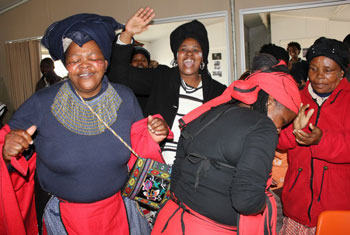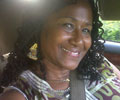
A gathering of African women in Azania/South Africa
African women must be organized! During the last week of November and the first week of December 2011, the world has been focused on the 194-nation UN framework convention for climate change held in Durban South Africa. While the rich countries of the West lead the meeting in their march towards more greater exercise of control over the question of global warming by refusing to sign the Kyoto accord or by pushing back any pollution controls to 2020, the rest of the developing and underdeveloped world suffers with record heat, drought, turrencial rains, tornadoes, hurricanes and millions left homeless and starving.
Who suffers most in these conditions? African women and children. While thousands pour into the streets of Durban protesting the slow movement of the developed world to make real changes in the imbalanced consumption of energy and pollution per capita, women farmers demonstrate letting the world know that they have had enough! African women bear the burden of their nation and communities as they struggle to grow food to feed and raise money for their families. They cry out “Climate Justice, not Climate Apartheid”, reminding us that not much has changed since apartheid ended. We are finally at the point of realizing that governments to change our reality, the People make change.
Africa is rampant with war torn areas from North to South Africa, East and West and who suffers from war most? African women and children. Climate change impacts populations that move from one area to another looking for food and shelter. Groups are fighting for rich soil for growing food or harvesting minerals pirated by imperialist countries corporations. So if the land is good, the people are moved, or killed.
In the Democratic Republic of the Congo, the latest research published in the American journal in Public health finds that 48 women are raped every hour (that’s 1,152 every day). It’s happening in the home, in the village, on the road, in schools or markets. Where there is anger, resentment, hunger, poverty, great need, the targets is violence against Women and children!
The Congo is considered the center of rape as a weapon of war in Africa and the world! One of the sisters in my community recently visited the Congo on a fact finding tour and interviewed over 120 women. (will share that in a separate story). She was shocked to find that not only are women raped more than once, but old women, grandmothers were being raped.
Today, women in the Congo are protesting, demonstrating and standing up for their rights and have gone to the ballot to vote for a new president. But they will have to do more.
“African women bear the burden of their nation and communities as they struggle to grow food to feed and raise money for their families.”
In the Niger Delta, the southern region of Nigeria, West Africa, Exxon, Mobil, Shell and others are raping the land because of the rich oil reserves. This region is the third largest mangrove forest and is the center of Nigeria’s oil industry. I heard an activist from Nigeria who was apart of the climate change demonstrations say that Exxon and others have 3 to 4 oil spills a week. They do not maintain their equipment and pay off the Nigerian government and police to push the people back from the rich land, kill and imprison those who protest against what the oil companies are doing and make no amends to clean the air, land and soil of the multiple pollutants that have been created by this human and natural assault on the land and the people. Women can not use the land for planting or water and are left without a way to take care of themselves and their families. And then there is the violence. But women are standing up, organizing, demanding human and citizens rights to clean water, land and the ability to provide for themselves. A few years back, we remember the news of the Agoni women taking possession of the Shell Oil refinery and holding the workers hostage until roads were repaired, houses and schools built and other reparations made in the interest of the people.
The movements for democracy in Africa and the occupy movements in the developed world bear witness to the Power of the People. It is our time and as women, we are on the front lines of the struggle for land, for clean air and water, and the right to live and provide for ourselves as human beings. We must be organized!

